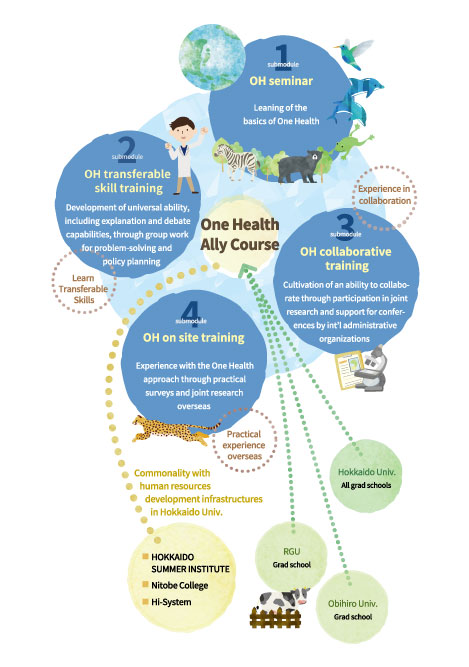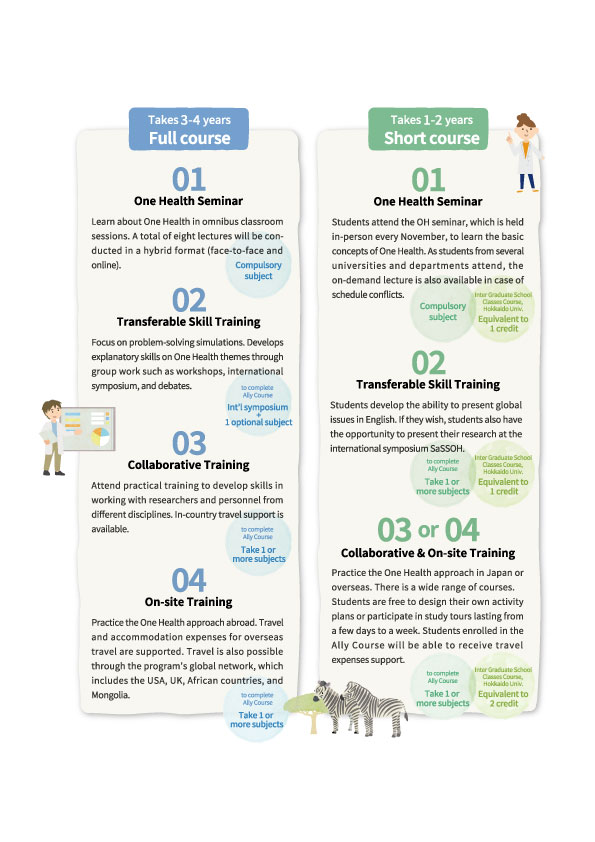- Home
- One Health Ally Course
One Health Ally Course

PDF Pamphlet The "One Health (OH) Module" implemented in the WISE program for One Health Frontier Excellence Graduate School Program is a unique practical education module conducted by the One Health Research Center in collaboration with industry, academia, and government. Achieving One Health requires not only fostering experts in this program to become leaders in One Health but also requires the participation of experts from various fields.
In this program, the OH Module is offered as the "One Health Ally Course (Ally Course)" to graduate students at Hokkaido University regardless of their academic background, as well as to graduate students from affiliated universities. By having graduate students with diverse academic backgrounds participate in this OH Module, it will lead to the cultivation of "One Health Allied Collaborators" who will practice interdisciplinary activities in the future. It will also be a very meaningful opportunity for students who are interested in international organizations or overseas activities but do not have the opportunity to engage in such activities. We would be delighted if you could participate in the Ally Course, a cross-disciplinary, inter-university special education program that provides the essence of One Health to students in both humanities and sciences.
"Ally Course" as Hokkaido University's Major-Minor System
Hokkaido University aims to introduce the "Hokkaido University version of the Major-Minor System," which enhances the value of graduating students by providing graduate students with additional skills and knowledge. The Ally Course provides graduate students with the opportunity to acquire such additional skills related to One Health. Furthermore, it is a special education program that forms the foundation for the competencies required when working in international organizations such as the WHO.

Eligibility and Participation in the Program
AThe Ally Course is open to graduate students at Hokkaido University (regardless of their academic background) as well as graduate students from affiliated universities. Additionally, students at Hokkaido University (excluding those affiliated with the Graduate School of Veterinary Medicine and Graduate School of Infectious Diseases) can choose between the "Full Course," which requires 3-4 years of study, and the "Short Course," which requires 1-2 years of study. To participate in the Ally Course, students must pass a selection examination. Upon meeting the graduation requirements, participants will be awarded a course completion certificate.
For details regarding eligibility and how to participate in the Ally Course, please click here.
For the curriculum and graduation requirements for the Ally Course, please click here.
Curriculum
The Ally Course consists of four sub-modules. In terms of credits, it is equivalent to approximately 8 credits (approximately 4 credits for the Short Course).
Ally Course (OH Module) Syllabus
- Sub-Module1:OH Seminar implemented as a Graduate School subject
- Sub-Module 2:OH transferable skill training (Development of generic skills through group work)
- Sub-Module 3:OH collaborative training (Practical training to enhance collaborative skills)
- Sub-Module 4:OH on site training (Experience in practical overseas settings)

Activities of Sub-Module 3
In the core Sub-Module 3 of the course, the following activities are envisioned:
- Through supporting the preparation, operation, and reporting of conferences hosted by international organizations, students will experience the activities of international organizations.
- Students will create a disease risk profile by region, cause, animal species, and vector insect on a global scale. Utilizing this, they will conduct needs assessments and advance the establishment of a system to provide technical cooperation and training tailored to the needs of developing diagnostic, testing, and treatment methods, as well as training programs.
- Domestic SFDA (Student Free Design Activities) For practical experience with One Health/One Health approaches, students who have completed the One Health Seminar and One Health Transferable Skill Training will plan and implement activities related to One Health/One Health approaches at external institutions. External institutions are broadly defined to include domestic and international private, governmental, educational research institutions, and non-profit organizations.
Activities of Sub-Module 4
- Overseas On-Site Training
Students will collaborate with students from different fields under the same topic, along with supervising faculty, and engage in activities abroad. For example, they will conduct field surveys overseas as part of interdisciplinary collaborations. - Overseas SFDA (Student Free Design Activities)
In Sub-Module 3, activities planned at domestic external institutions will be carried out at overseas external institutions (private, governmental, educational research institutions, non-profit organizations, etc.) related to One Health/One Health approaches.
In Sub-modules 3 and 4, students will receive travel support including transportation expenses (travel expenses) and accommodation expenses.
